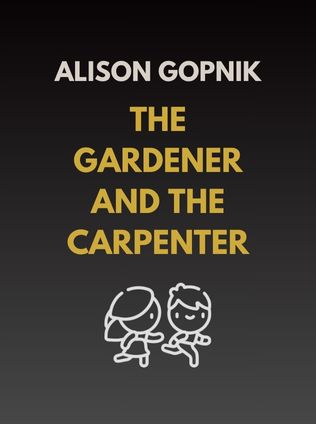
The Gardener and the Carpenter
What the New Science of Child Development Tells Us About the Relationship Between Parents and Children
By Alison Gopnik
Published 08/2016
About the Author
Alison Gopnik is a renowned professor of psychology and affiliate professor of philosophy at the University of California, Berkeley. She is widely recognized for her pioneering work in cognitive science and developmental psychology, particularly in understanding how children think, learn, and perceive the world around them. Gopnik has authored several influential books, including The Philosophical Baby, Causal Learning, and The Scientist in the Crib. In addition to her academic work, she writes the "Mind and Matter" column for The Wall Street Journal and has published over 100 journal articles, contributing significantly to the fields of psychology and philosophy.
Main Idea
The Gardener and the Carpenter by Alison Gopnik offers a profound exploration of modern parenting and child development. Gopnik challenges the prevalent notion of parenting as a job that demands careful planning and control, arguing instead for a more natural, nurturing approach. She compares two distinct parenting styles: the "carpenter," who shapes and molds a child according to a predetermined blueprint, and the "gardener," who provides a rich environment for the child to grow, allowing them to develop according to their own unique nature. Gopnik's central thesis is that the best way to raise children is not to sculpt them into a particular form but to nurture them in an environment where they can explore, learn, and flourish on their own terms.
Table of Contents
- Parenting: The Gardener Versus the Carpenter
- How the Carpenter Society Fails Children and Parents
- Supporting Instead of Controlling: How Children Learn
- Observational Learning and Imitation
- Learning Through Testimony
- Play: A Natural Learning Mechanism
- Older Children: Carpenter Schooling
Parenting: The Gardener Versus the Carpenter
Gopnik introduces the metaphor of the gardener and the carpenter to illustrate the fundamental difference between two approaches to parenting. The carpenter represents a parent who meticulously plans and shapes their child's life, working to construct a specific outcome—much like a carpenter follows a blueprint to build a piece of furniture. This approach, Gopnik argues, is flawed because it assumes that children are passive materials to be shaped, rather than individuals with their own natural tendencies and potential.
In contrast, the gardener approach emphasizes creating a supportive environment that allows children to grow and develop naturally. Just as a gardener provides the right soil, water, and sunlight to help plants thrive, a parent should provide love, support, and opportunities for exploration, trusting that the child will find their own way. Gopnik writes:
“Caring for children is not a matter of molding them like clay, but of tending them like flowers in a garden, letting them grow and unfold as they are meant to.” —Alison Gopnik
This gardener model of parenting is grounded in the belief that children are active learners who thrive when given the freedom to explore their interests and make their own discoveries. The role of the parent is not to dictate the child's path but to support them as they navigate their own journey. This approach also acknowledges the inherent unpredictability of child development; just as no two plants grow in exactly the same way, no two children will follow the same path, even if they are given the same opportunities and care.
How the Carpenter Society Fails Children and Parents
Gopnik extends the carpenter-gardener metaphor to critique broader societal attitudes towards parenting and education. In modern society, particularly in the United States, there is a strong emphasis on outcomes and measurable success. This is evident in the proliferation of parenting books and programs that promise to produce "successful" children, as well as in the education system, which often prioritizes test scores and standardized measures of achievement over individual growth and creativity.
Gopnik argues that this outcome-oriented approach is harmful because it places immense pressure on parents to "get it right" and on children to meet specific expectations. It treats parenting as a job that can be done well or poorly based on the results it produces, rather than as a relationship based on love and support. This mindset leads to what Gopnik calls "carpenter parenting," where parents feel compelled to control every aspect of their child's development, from academic performance to social interactions, in order to ensure a successful outcome.
However, this approach often backfires, leading to stress and anxiety for both parents and children. When parents try to mold their children into a specific form, they may inadvertently stifle the child's natural curiosity and creativity, leading to frustration and a sense of inadequacy. Gopnik notes:
“When we focus too much on controlling outcomes, we risk losing sight of the unique, unpredictable, and often wondrous nature of childhood itself.” —Alison Gopnik
The societal emphasis on outcomes also fails to recognize the broader context in which children are raised. Gopnik points out that raising children has always been a collective endeavor, with extended families and communities playing a crucial role in supporting parents and children. However, in modern industrialized societies, this communal support has largely disappeared, leaving parents to bear the full burden of child-rearing on their own. This shift has contributed to the rise of the nuclear family and the increasing financial and emotional pressures on parents, particularly as the costs of child care and education continue to rise.
Sign up for FREE and get access to 1,400+ books summaries.
You May Also Like
The Subtle Art of Not Giving a F*ck
A Counterintuitive Approach to Living a Good Life
By Mark MansonRich Dad Poor Dad
What the Rich Teach Their Kids About Money - That the Poor and Middle Class Do Not!
By Robert T. KiyosakiHow To Win Friends and Influence People
The All-Time Classic Manual Of People Skills
By Dale CarnegieFreakonomics
A Rogue Economist Explores the Hidden Side of Everything
By Steven D. Levitt and Stephen J. Dubner



















